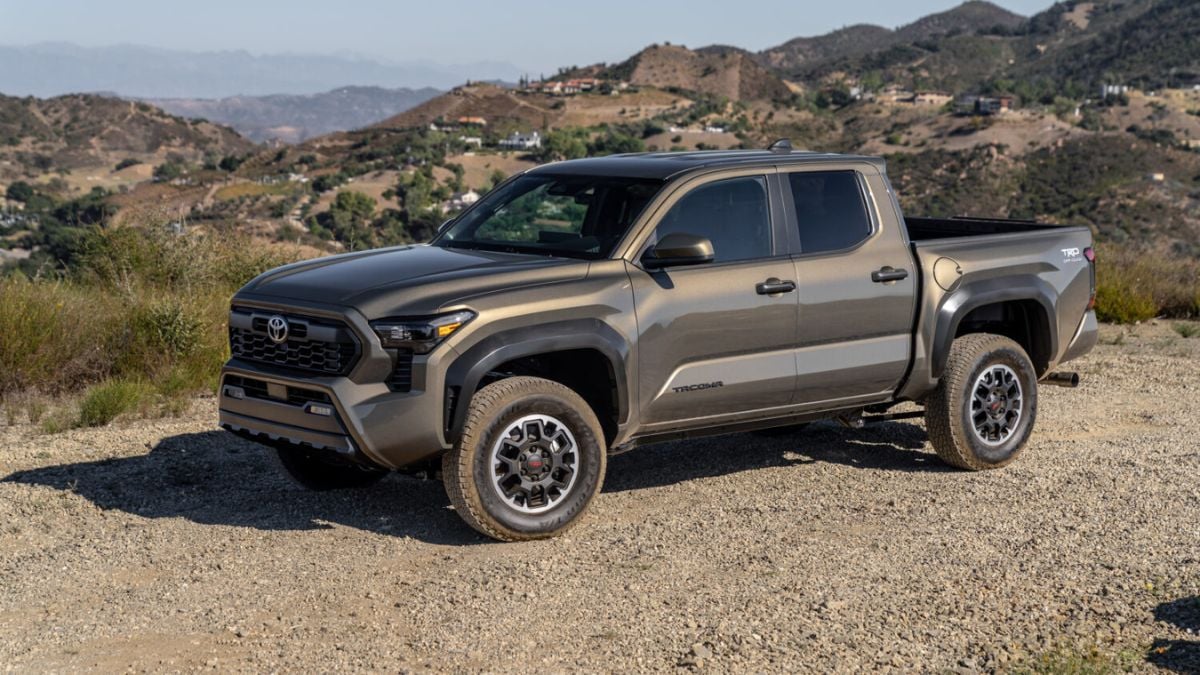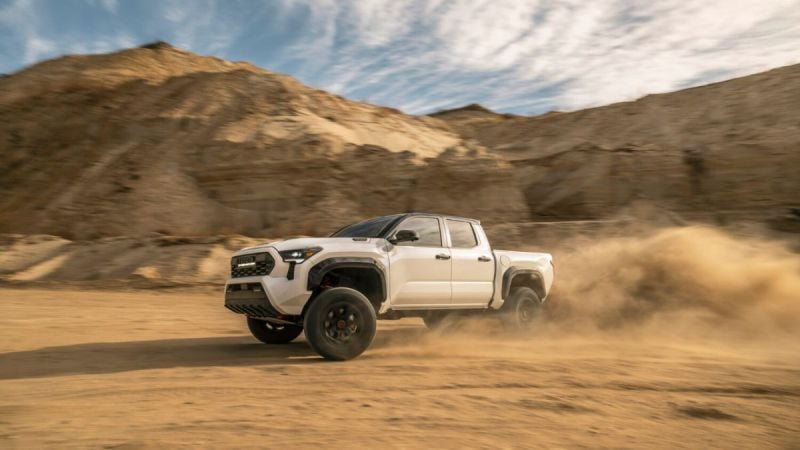This evening, I was scrolling through the "2016 Thru 2023 Toyota Tacoma Owners" group on Facebook and came across a post by Matt Homol that sparked an intense debate. Matt decided to switch his Tacoma’s oil from the recommended Mobil 1 0W-20 to Royal Purple 5W-30, and his experience was nothing short of game-changing. According to Matt, "After switching to Royal Purple 5W-30, the difference is night and day. My truck feels more solid, with less slipping off the line, less gear hunting, and an overall quieter tick. Despite what Toyota and the EPA recommend, I think 5W-30 is the way to go for better performance."
The Great Oil Debate: Is Toyota’s Recommendation the Best Choice?
Toyota specifies 0W-20 for modern Tacomas primarily because it optimizes fuel efficiency, minimizes internal friction, and ensures proper oil flow during cold starts. This aligns with North American emissions and efficiency regulations. However, Matt’s experience raises an important question, does the manufacturer’s recommendation always equate to the best real-world performance?
Royal Purple is known for its high-quality synthetic oil formulations, boasting superior protection and better engine performance. Many Tacoma owners, like Matt, have experimented with different viscosities and reported improvements in drivability. The key argument against Toyota’s 0W-20 recommendation is that while it enhances efficiency, it may not provide the best performance under all driving conditions.
What Tacoma Owners Have to Say
This debate didn't go unnoticed in the Facebook group, and several Tacoma owners chimed in with their thoughts.
Hunter weighed in with a different perspective, stating, "Mobil 1 is better than Royal Purple, haha. I run Mobil 1 5W-30, and it’s guaranteed for 20,000 miles. While I still change it every 5,000 miles, I wouldn’t call it trash. I just swapped from their 0W-30, and even after going about 7,000 miles, it was still clear on the dipstick."
On the other hand, Danaan took a more skeptical stance, saying, "We may disagree on where the buttons should be for the volume on the steering wheel or whether or not you let the gas cap dangle when you fill the tank, but at least we all agree that this is nonsense. It’s a regular hallmark moment. Honestly, I’m glad this post exists. With all the varying points of view here, we can all come together over the fact that this post is simply confidently written misinformation."
Then Matt himself provided a more nuanced take, explaining, "Toyota specifies 0W-20 for its modern engines because it optimizes fuel efficiency, reduces internal friction, and ensures proper oil flow during cold starts, particularly in compliance with North American emissions and efficiency standards. While switching to 5W-30 can provide a thicker oil film at operating temperatures, reducing valvetrain noise and potentially offering slight improvements in wear resistance under heavy loads, it also increases oil pressure and slightly reduces efficiency. The perceived 'solid drive' and reduced gear hunting are likely due to minor changes in VVT-i and timing chain lubrication rather than actual performance gains. Although 5W-30 is used in some global markets, deviating from the manufacturer’s recommended viscosity can impact long-term engine wear, oil pump strain, and warranty coverage, making it a trade-off rather than a clear upgrade."

Why Some Tacoma Owners Are Making the Switch
Many Tacoma owners who push their trucks beyond standard city commuting, whether towing, off-roading, or hauling heavy loads, have found that a slightly thicker oil like 5W-30 provides additional protection and stability. The argument is that while 0W-20 is designed for optimal efficiency, it might not be the best choice for owners who demand more from their trucks.
Interestingly, in certain markets outside North America, Toyota does indeed recommend 5W-30 for the same engines. This raises an important question: Is Toyota’s North American oil recommendation purely based on regulatory compliance rather than performance?
What’s the Risk of Deviating from 0W-20?
Before you rush to swap your oil to a thicker viscosity, it’s important to consider the potential risks.
-
Warranty Concerns: Using an oil viscosity not specified by Toyota could potentially void your powertrain warranty.
-
Fuel Economy: Thicker oil can create more resistance in the engine, leading to a slight decrease in fuel efficiency.
-
Cold-Weather Performance: In colder climates, 0W-20 flows better during start-up, reducing engine wear.
-
Oil Pump Strain: Higher viscosity oil requires more force to circulate, which can put additional strain on the oil pump over time.
More Real-World Tacoma Experiences
Some Tacoma owners are so committed to their trucks that they can’t imagine driving anything else. One owner even stated, "I am on my second 2024 Toyota Tacoma this year, and I will always own a Tacoma for the rest of my life." This level of loyalty speaks volumes about the Tacoma’s reliability and performance.
For others, choosing the right Tacoma model isn’t so simple. Some have found that the 2023 Tacoma TRD Off-Road left them reconsidering an older model. If newer models don’t deliver the same driving feel as past generations, what does that say about Toyota’s evolving design choices?
Another common debate is whether to stick with an automatic transmission or go for the classic manual. Many Tacoma enthusiasts find themselves torn between these two options. With the manual offering a more engaging drive and the automatic providing convenience, it’s no surprise this discussion continues.
For first-time truck owners, the excitement of purchasing a Tacoma can sometimes turn into uncertainty. One owner shared their experience of ordering a 2024 Tacoma and feeling nervous about their decision. These real-world insights help prospective buyers make informed choices.
My Take on the Oil Debate
After hearing all these perspectives, I can’t help but see both sides of the argument. On one hand, Toyota engineers spend years developing these engines and choosing the best oil for efficiency and longevity. On the other, real-world experiences from Tacoma owners suggest that using a slightly thicker oil can yield tangible improvements in how the truck drives. Personally, if I owned a Tacoma and used it for towing or off-roading, I’d be tempted to try 5W-30 to see if it made a difference. However, I’d also keep in mind the risks of straying from manufacturer guidelines. In the end, it all boils down to your driving habits and how much risk you’re willing to take for performance.
Your Turn: What’s Your Take?
Now, it’s time for you to weigh in. Have you experimented with different oil viscosities in your Tacoma? Did you notice a difference in performance, efficiency, or overall feel? Share your experience in the comments below!
Additionally, do you believe automakers prioritize regulatory standards over real-world performance, or do you think Toyota's recommendations are truly optimal for all drivers? Let’s get the conversation going.
Narek Hareyan is a young automotive journalist with experience in a golf cart dealership and an interest in the automotive industry. Follow Narek on X for daily news coverage about cars.
Set Torque News as Preferred Source on Google












Comments
Everything in pretty much…
Permalink
Everything in pretty much every vehicle is a compromise - from the floor mats to the steering wheel - including the oil. Engineers and designers and sales and budgets all have to agree on stuff.
Anybody with a post 2019…
Permalink
Anybody with a post 2019 Taco seems to have more than oil thickness to worry about.
It's not possible that he…
Permalink
It's not possible that he has experienced always slipping by changing motor oil regardless if he changes weight or brand or the amount. Motorola has nothing to do with your transmission, which is where he's implying that he gets less slippage. First of all, he shouldn't have gotten any slippage to begin with at all, being as young of a truck as his is. The second thing is Motorola has nothing to do with your transmission slipping or not slipping, much less changing the weight or the brand or the quantity of Motorola.
Posting stuff like I decided…
Permalink
In reply to It's not possible that he… by Matt (not verified)
Posting stuff like I decided to change the oil type and weight will surely help him not get his warranty work fixed lol and he will have warranty work aren't they having serious engine issues with those trucks
Motorola???? Is that AI…
Permalink
In reply to It's not possible that he… by Matt (not verified)
Motorola???? Is that AI speak for motpr oil.
Manufacturer's…
Permalink
Manufacturer's recommendation should be taken with a grain of salt. Because many of us also agree that 10,000 mile oil change intervals, recommend by the manufacturer, is also a myth and many of us change the oil much sooner. I agree, use the oil viscosity that aligns with the weather temp of your region.
It's always funny to me when…
Permalink
It's always funny to me when period think they've discovered something new haha. Using a heavier oil is a decades old practice that most home mechanics and people who do maintenance on their own vehicles use. If it says 5w you use 30w, you can even use different oil weight for different seasons.
"...My truck feels more…
Permalink
"...My truck feels more solid, with less slipping off the line, less gear hunting..."
This article is ridiculous clickbait. Engine oil has absolutely nothing to do with the transmission slipping or hunting.
The brand and grade of oil used is far less important than timely changes. The long interval between oil changes may not be advisable depending on driving conditions. Change your oil every 10000km/6000mi with good quality full synthetic oil, use good quality OEM style filters, and the engine will give you a long service life.
I had a 2013 Toyota Tacoma…
Permalink
I had a 2013 Toyota Tacoma TRD and loved it and then I made the most dumbest thing ever, I traded it in for a silverado. And now I can't afford another Tacoma new 55k used 35k I'm just going to have to live with the mistake I made!
I've been a Toyota Master…
Permalink
I've been a Toyota Master Tech for 40 years. I'm dying to hear exactly how a different weight of engine oil helps the Tacoma get off the line quicker. Inquiring minds want to know. 🙄
When I read that I wonder…
Permalink
In reply to I've been a Toyota Master… by Dave (not verified)
When I read that I wonder what that had to do with getting off the line faster. Was he drag racing? Lol
Until I see results from oil…
Permalink
Until I see results from oil analysis and long term studies, I will bet on the crowd of highly trained and experienced engineers who work for Toyota. They know what they are doing, vs. "It feels better " lol!
I’ll wear the Toyota t till…
Permalink
I’ll wear the Toyota t till the 5/yr 60k powertrain expires, but I’ve watched Mobil 1 and corvette go from 5w 30 to version 1 10w 40 to 2nd version 0w40 with anti-scaling properties behind the valves because direct injection motors leave carbon deposits behind the valves. Thanks to toy they still combine port injection which keeps detergent gas cleaning behind the valves, but the vette 0w-40 is for extreme performance. According to oil lab testing, Toyota 0-20 has 10 times more molybdenum than Mobil 1, Toyota specifies this since Mobil 1 is the Toyota 0w-20 feedstock. I will switch to the newest vette xtreme m1 when my Toyota warranties expire.
Why deviate from the R&D…
Permalink
Why deviate from the R&D of a major manufacturer.? Albeit I do have 5\20 in my Outback - no need for 30 weight in there as it's waaaaay too thick.
We also should remember how…
Permalink
We also should remember how important outside temperature is for what viscosity oil is selected...or used to be.
Here in California I've been…
Permalink
Here in California I've been using 5/30 for 20 years only recently switching to 5/30 synthetic 0/20 is only rated to 90° outside air temperature if you look at Toyota specs I believe running in hot climates contributes to carboning of the rings from breakdown of the oil if you live in Minnesota 020 is probably great it's been the winter time
I own a 2019 sport . I’ve…
Permalink
I own a 2019 sport . I’ve been a member of various forums and the common themes seems to be , how to improve the drive , response on , acceleration decelleration , gear hunting , shift points , etc etc , All valid concerns for the third gen era tacos and all mid size n/a trucks as well . In an effort to maximize mpgs to meet government mandates the transmissions are tuned for mpg . I opted for a 6 spd manual and my only complaint has been a squeaky clutch pedal , replaced under warranty in 2020 ,
I have a 2007 FJ Cruiser…
Permalink
I have a 2007 FJ Cruiser. When Toyota started using 0W20 that's what they used instead of the recommended 5W30. What I noticed was louder ticking noises. I didn't notice a difference in performance or gas mileage. Next oil change I specified 5W30 and it quieted back down. Same experience with my brother in law's Venza. They use 0W20 because they want one oil for everything. Hybrids, PHEVS, every thing with stop-start, this oil will protect these better. They only need oil that will allow it to run for the length of the warranty.
If you don't believe auto…
Permalink
If you don't believe auto engineers prioritize regulatory requirements over performance how do you explain low tension piston rings and 10000 mile oil changes. Since 2007, Toyota engines continue to be prone to oil consumption issues yet these recommendations continue!
I use EURO 5/40... GO TO…
Permalink
I use EURO 5/40... GO TO MOBILEONE.COM AND READ THE DIFFERENCE BETWEEN EUROPEAN OIL AND AMERICAN OIL.
If other markets are ok with…
Permalink
If other markets are ok with 5w-30, did those markets use a different oil pump ? If not then argument is out the window.
I agree with everything in…
Permalink
I agree with everything in this article, however, the only real way to know if one viscosity or brand of oil is better or worse for your specific vehicle, driven the way you drive, in the climate where you live, etc. is to do used oil analysis. If you are straining an oil pump, oil analysis will show it. If your getting excessive wear from cold starts, oil analysis will show it. If you are changing your oil at too long or too short of intervals, oil analysis will show it.